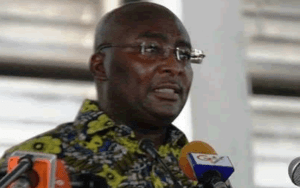We’re using digitalisation to de-risk agricultural sector to promote agribusiness – Bawumia

The Akufo-Addo-led Government is building enablers and efficient systems to de-risk Ghana’s agricultural sector to drive transformation and engender growth, Vice President Mahamudu Bawumia has said.
He outlined various policies and programmes including the digitalisation of public sector institutions, rolling out of unique national identity cards (Ghana-Card), Mobile Money Interoperability Payment System, and National Digital Property Addressing System as key pillars for de-risking the agricultural sector towards engendering growth and economic expansion.
“Government shall continue to address the major factors militating against the Ghanaian farmers’ desire to expand and compete on the global market,” he said.
“Therefore government will pursue its agenda of ensuring accurate data gathering and storage, easier access to credit through the establishment of proper identity of everyone and location to be reached through financial inclusion.”
Vice President Bawumia gave the assurance when he hosted participants of the Annual Agricultural Students Career Guidance and Mentorship Dialogue BootCamp (AG-STUD AFRICA BOOTCAMP 2022) at the Jubilee House in Accra.
The five-day event is being held on the theme: “Digitalisation – The Enabler, The Game Changer, and the Future for the Agri-Youth,” which attracted students from the Kwadaso and Wenchi Agricultural colleges, Adidome Farm Institute, the universities of Ghana, Cape Coast, and Development Studies, Damongo Agricultural College, and Accra Academy.
It was organised by Agrihouse Foundation to shape and promote conversation on agriculture through smart thinking, effective communication and impactful agric-friendly projects.
Agrihouse Foundation is a non-governmental organisation with special focus on shaping the mindset and perception of the youth on agriculture.
It consciously promotes conversations on agribusiness through advocacy, capacity-building, people-impact programmes, trade shows, project implementation, field demonstrations, research and data collection, exhibitions, conferences and seminars.
Over the past five years, it had organised Agricultural Students BootCamp to change mindsets, driving a direct Agri-Youth impact initiatives, mentoring young people interested in pursuing careers in agribusiness and entrepreneurship as well as other activities in the agricultural value-chain to ensure food security in the country.
Ms Alberta Nana Akyaa Akosa Sarpong is the Founder and Executive Director of Agrihouse Foundation, with Dr Zanetor Agyeman-Rawlings, Member of Parliament of Korle-Klottey, as Patron of the Annual Agricultural BootCamp.
Vice President Bawumia said he would use the opportunity of being the Head of Government’s Economic Management Team to bring change and transformation through digitalisation initiatives.
“And so when we came into office in 2017, the President gave me the mandate to change the way things have been done in the country over the past 60 years of independence, and put in place efficient systems to transform the Ghanaian economy by mitigating risks and make it efficient, hence I focused on using digitalisation to achieve that agenda,” Dr Bawumia explained.
“The application of technological processes to change the way by which we perform economic activities, how individuals and businesses interact with each other and with government agencies and institutions is what we desire.”
“Digitalisation is critical in this era of the fourth industrial revolution focusing on robotics and artificial intelligence to transform the economy, how to collect and store data and use the data to improve economic activities and so, we see digitalisation as de-risking the agricultural sector because there are a lots of perceived risks existing in the sector.”
Those efforts would, without doubt, enable Ghana to transition from the current dependency mentality to the “Can-Do attitude.”
The Vice President urged the participants and the youth in general to develop a can-do mindset to build a sustainable future while striving to pursue skills to drive the country towards realising its transformation agenda.
He said agriculture played a critical role in the socio-economic development of Ghana, employing almost 60 per cent of the population and bridging the income gap.
“We want to end the vicious cycle of rhetoric and under-development. Our government is pursuing an economic transformation agenda through digitisation.”
Dr Bawumia pledged his commitment to supporting the activities of Agrihouse Foundation to mentor young people to pursue careers in agriculture, entrepreneurship and agribusinesses.
Dr John Kofi Mensah, the Managing Director of Agricultural Development Bank, reaffirmed the Bank’s commitment to supporting young people financially to pursue their vision of becoming agricultural entrepreneurs.
The Bank, for instance, had instituted a special scheme to provide stipends for young persons into agribusiness and land for pineapple plantation as part of its corporate social responsibility.
Source: GNA
